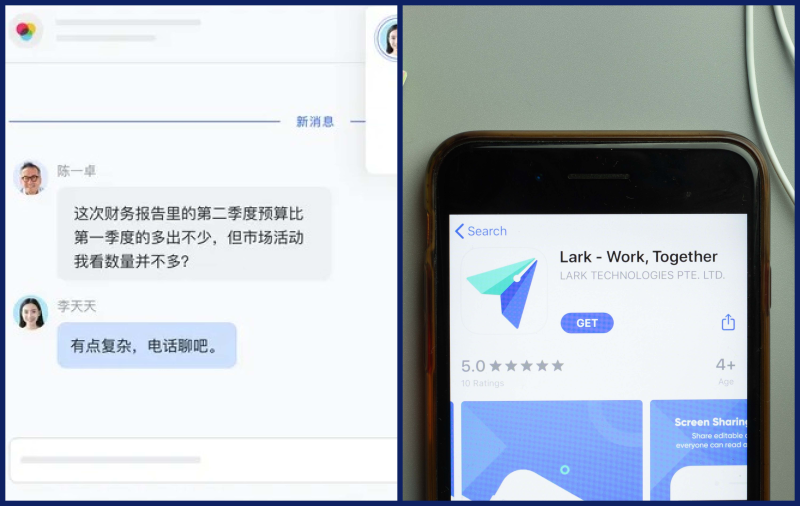
Feishu and Lark for dummies: 101 on the new work collaboration app coming for Slack
share on
ByteDance's new work collaboration tool Feishu has been in the news lately after it was revealed in an internal virtual meeting that its subscription revenue hit US$100 million last year, according to The Wall Street Journal who quoted an employee at the meeting.
The revenue report was reportedly revealed by Xie Xin, the chief executive of Feishu, in a meeting. It was reported that employees were told that the product’s annual recurring revenue jumped around 270% from 2021.
MARKETING-INTERACTIVE has reached out to confirm the report but the facts still stand that Feishu is taking the world by storm and that it might soon replace our well-loved Slack.
Below, we break down everything you need to know about Feishu and its international counterpart, Lark.
Don't miss: Zoom hits refresh on visual identity
What is Feishu?
Feishu is an enterprise collaboration platform under ByteDance. Feishu offers services for business that include video conferencing and chat capabilities.
Feishu allows users to reply to messages with emojis, stores messages in the cloud and enables high quality audio and video conferences to take place at any time. The system also automatically takes notes for video calls, has shared calendars and a collaborative document function.
What makes Feishu stand out though is that it has an intelligent robot assistant which can be customised. It will help push the capabilities of integrated applications and automatically synchronise information. Users can also talk to the robot and get it to help users complete tasks and send reminders, according to Feishu on its website.
What is Lark?
Feishu as an app exists to service Chinese clients in China. Lark on the other hand is its international sister app that was launched in 2019 and that is gaining popularity now. Lark is a next generation office suite that integrates messaging, schedule management, collaborative documents, video conferencing, and many more applications in a single platform, according to its website.
It also offers users the chance for multilingual auto translation during meetings, the recording of minutes and more.
What makes it stand out again is that users can use tools and plugins such as Jira, GitHub and Asana. Users can also inset a group chat into a document and check a team members schedule right from a chat itself.
Could Feishu/Lark topple other established productivity applications?
As we watch the rise of Feishu and Lark, the question on everyone's mind is, will it topple existing productivity and work-based applications such as Slack or Zoom? Industry experts MARKETING INTERACTIVE spoke to seem to think that it might actually have a chance.
"In the Western world, apps such as Slack, Zoom and Teams are very well established in companies and people are very used to using them. But the thing is, they exist as separate entities and no one tool has everything," said Oo Gin Lee, the managing director of Gloo PR. He continued by explaining that Slack exists primarily for text-based communications and that apps such as Zoom and Teams are used mainly for video calls. Google on the other hand is a key application used by businesses for collaborative documents. "If Feishu and Lark can combine all that into one solid product, they really have a really good chance of taking over these apps," Oo said.
That said, Feishu and Lark are up against significant challenges. One of these challenges is that other applications are more established than they are. "It's not easy to dislodge established market leaders so Bytedance will have that to contend with," he said. Adding on Oo mentioned that security remains an issue as more consumers express concern over the safety of their data. "One major challenge that Feishu and Lark might face is that they the trust of users at the moment," said Oo. He cited an example of Google and how many years it took for users to trust Google enough to put their documents in its cloud. "Feishu's challenege then is to prove that it will be independent, that there will be no politics behind it and that users can trust them with their data," said Oo.
Agreeing with Oo, Don Anderson, the CEO of Kaddadle, noted, "Trust building among target clients is naturally critical, but the value ByteDance offers is a more advanced enterprise collaboration suite. Slack is pretty bare bones."
Adding on, Pramodh Rai, the CEO and co-founder of Cyber Sierra, a cyber security firm, noted that the best thing for Slack to do is to double down on its existing user base and outserve them in as many ways as possible. "This includes pricing, superior feature suite in product and best-in-class customer service. Next, Slack should find ways to compete with Lark on its own turf by ensuring apt localisation so that it can play on its front foot by growing its market share, as opposed to defending its position," he said.
He added that Bytedance’s strategy is likely to diversify its revenue streams amidst intensifying competition on its main product line, TikTok, thereby reducing reliance on consumer-facing products, which may also be subject to greater regulatory scrutiny. "By focusing on the enterprise software market, Bytedance is simultaneously developing a presence in a growing market and one that’s typically less subject to regulatory scrutiny," he said.
Related articles:
Will WhatsApp's new Communities feature give Teams and Slack a run for their money?
Salesforce snaps up Slack for US$27.7bn to 'shape future of enterprise software'
Analysis: Can Salesforce's pick up of Slack dethrone Microsoft Teams?
share on
Free newsletter
Get the daily lowdown on Asia's top marketing stories.
We break down the big and messy topics of the day so you're updated on the most important developments in Asia's marketing development – for free.
subscribe now open in new window
